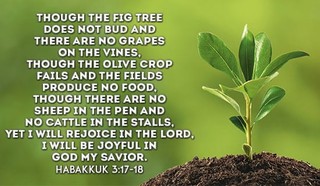- Recent Translations
- All Translations
Abacuc 3
Share
Settings
Abacuc 3 Commentary
Chapter 3
The prophet beseeches God for his people. (1,2) He calls to mind former deliverances. (3-15) His firm trust in the Divine mercy. (16-19)
Verses 1-2 The word prayer seems used here for an act of devotion. The Lord would revive his work among the people in the midst of the years of adversity. This may be applied to every season when the church, or believers, suffer under afflictions and trials. Mercy is what we must flee to for refuge, and rely upon as our only plea. We must not say, Remember our merit, but, Lord, remember thy own mercy.
Verses 3-15 God's people, when in distress, and ready to despair, seek help by considering the days of old, and the years of ancient times, and by pleading them with God in prayer. The resemblance between the Babylonish and Egyptian captivities, naturally presents itself to the mind, as well as the possibility of a like deliverance through the power of Jehovah. God appeared in his glory. All the powers of nature are shaken, and the course of nature changed, but all is for the salvation of God's own people. Even what seems least likely, shall be made to work for their salvation. Hereby is given a type and figure of the redemption of the world by Jesus Christ. It is for salvation with thine anointed. Joshua who led the armies of Israel, was a figure of Him whose name he bare, even Jesus, our Joshua. In all the salvations wrought for them, God looked upon Christ the Anointed, and brought deliverances to pass by him. All the wonders done for Israel of old, were nothing to that which was done when the Son of God suffered on the cross for the sins of his people. How glorious his resurrection and ascension! And how much more glorious will be his second coming, to put an end to all that opposes him, and all that causes suffering to his people!
Verses 16-19 When we see a day of trouble approach, it concerns us to prepare. A good hope through grace is founded in holy fear. The prophet looked back upon the experiences of the church in former ages, and observed what great things God had done for them, and so was not only recovered, but filled with holy joy. He resolved to delight and triumph in the Lord; for when all is gone, his God is not gone. Destroy the vines and the fig-trees, and you make all the mirth of a carnal heart to cease. But those who, when full, enjoyed God in all, when emptied and poor, can enjoy all in God. They can sit down upon the heap of the ruins of their creature-comforts, and even then praise the Lord, as the God of their salvation, the salvation of the soul, and rejoice in him as such, in their greatest distresses. Joy in the Lord is especially seasonable when we meet with losses and crosses in the world. Even when provisions are cut off, to make it appear that man lives not by bread alone, we may be supplied by the graces and comforts of God's Spirit. Then we shall be strong for spiritual warfare and work, and with enlargement of heart may run the way of his commandments, and outrun our troubles. And we shall be successful in spiritual undertakings. Thus the prophet, who began his prayer with fear and trembling, ends it with joy and triumph. And thus faith in Christ prepares for every event. The name of Jesus, when we can speak of Him as ours, is balm for every wound, a cordial for every care. It is as ointment poured forth, shedding fragrance through the whole soul. In the hope of a heavenly crown, let us sit loose to earthly possessions and comforts, and cheerfully bear up under crosses. Yet a little while, and He that shall come will come, and will not tarry; and where he is, we shall be also.
Abacuc 3 Commentaries
Chapter Summary
INTRODUCTION TO HABAKKUK 3
The title of this chapter is a prayer of Habakkuk the prophet, composed after the manner of a psalm of David, and directed to the chief singer, Hab 3:1,19. The occasion of it is expressed, Hab 3:2 in which the prophet declares his concern for the work of the Lord, and the promotion of the kingdom and interest of Christ; and observes the various steps that were, or would be, taken for the advancement of it; for which he prays, and suggests that these would be after the manner of the Lord's dealing with the people of Israel, and settling them in the land of Canaan, Hab 3:3-15 and there being several things awful in this account, both with respect to the judgments of God on his enemies, and the conflicts and trials of his own people, it greatly affected the mind of the prophet, Hab 3:16 and yet, in the view of the worst, he expresses his strong faith in the Lord, as to better times and things, that would most assuredly come, Hab 3:17-19.


